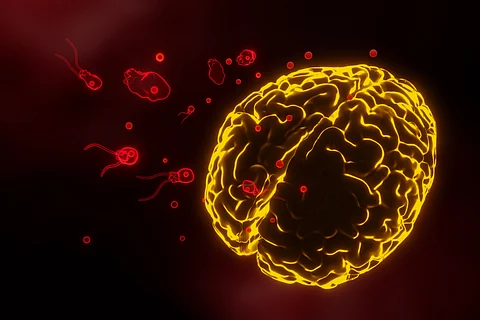

A 38-year-old man from Ukrampadi, near Chattanchal in Kerala’s Kasaragod district, died of suspected amoebic meningoencephalitis on September 22, 2024, while receiving treatment at a private hospital. This marks the latest fatality in a series of deaths from the rare and deadly brain infection, raising public health concerns across the state.
The state also recorded a death due to Nipah virus and a case of mpox this month.
The deceased, identified as M Manikandan, was the fifth reported victim of the infection in Kerala in the past two months. Manikandan, who had been working in Mumbai, returned to Kerala after falling sick with a fever. Initially, he sought treatment at the Government General Hospital in Kasaragod but was later transferred to a hospital in Kannur, where he was diagnosed with symptoms of amoebic encephalitis.
Kannur’s Deputy District Medical Officer, KC Sachin, told this reporter that a cerebrospinal fluid test suggested amoebic meningoencephalitis. A polymerase chain reaction (PCR) test was conducted to confirm the diagnosis. Manikandan had been treated with Miltefosine, a drug imported from Germany and used to combat amoebic infections. Patients in Kerala are also given azithromycin and amphotericin B.
Kerala has already reported four other deaths from amoebic meningoencephalitis. Victims included EP Mridul, a 12-year-old from Kozhikode, who died in July and V Dakshina, a 13-year-old from Kannur, who succumbed in June. Other cases involved Fadva, a 5-year-old girl from Malappuram and M Akhil (27) from Thiruvananthapuram.
Primary amoebic meningoencephalitis, caused by Naegleria fowleri also known as the brain-eating amoeba, is an extremely rare and often fatal infection. The amoeba, commonly found in warm freshwater lakes, ponds and rivers, enters the body through the nose, leading to brain tissue destruction. In rare cases, it can also survive in poorly maintained swimming pools. The infection typically occurs during the summer months, when water levels are low and children are particularly vulnerable.
Early symptoms include headache, fever and nausea, which can quickly progress to confusion, loss of balance and hallucinations. Diagnosis is primarily done through PCR tests of cerebrospinal fluid, but the rarity of the condition often makes detection challenging.
The first case of amoebic meningoencephalitis in India was detected in the state’s Alappuzha district in 2016, with sporadic cases reported in subsequent years. Despite reassurances from health officials that the infection is rare, public anxiety has grown due to the increasing frequency of cases across Kerala. The state recently reported an unusual cluster of eight adult cases in Thiruvananthapuram, bringing the total number of cases over five months to 19.
Kerala, however, has made significant strides in treating the infection. Of the 19 reported cases, 14 patients have survived, reducing the mortality rate from a global average of 97 per cent to 26 per cent. A recent success involved the discharge of ten patients from the Thiruvananthapuram Government Medical College Hospital after completing a 28-day treatment regimen.
Dr R Aravind, head of infectious diseases at the hospital, credited early detection and treatment for the improved survival rate. “It was a significant learning experience because we demonstrated that early identification and treatment can significantly improve the chances of saving patients with amoebic meningoencephalitis,” he said. “The infection causes severe brain swelling and death in otherwise healthy children, teenagers and young adults and it is extremely rare. It has a high fatality rate due to its rapid onset and delayed diagnosis.”
The state has also set up a specialised medical board and issued guidelines to prevent, diagnose and treat amoebic meningoencephalitis.
The outbreak in Thiruvananthapuram was traced back to a group of young people who had been inhaling water from a contaminated pond mixed with addictive substances, giving the amoeba direct access to their brains. Health officials were able to identify and treat the affected individuals early, further highlighting the importance of timely intervention.
The state established a special medical board, treating patients with a cocktail of antibiotics. The addition of Miltefosine to this regimen significantly improved patient outcomes.
Authorities have since advised the public to avoid swimming in stagnant water and to use nasal plugs when swimming. Those with head injuries or who have undergone nasal surgery have been urged to avoid entering waterbodies altogether.
Kerala has also begun researching the infection under the One Health platform, with support from institutions such as the Indian Council of Medical Research and the National Institute of Epidemiology. Researchers aim to understand why only a few individuals who enter the same water bodies are infected, with environmental factors like rising temperatures and water contamination believed to be contributing to the increase in cases.
Dr MP Jayakrishnan, additional professor of paediatrics at the Government Medical College Hospital in Kozhikode, attributed the global rise in such infections to warmer climates and unhygienic water conditions. “There has been a global increase in such cases. Factors like rising temperatures and stagnant, unhygienic water sources may contribute to this trend. This type of amoeba is particularly active in warm water,” he stated.